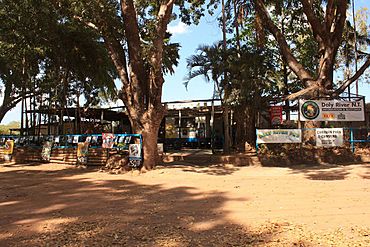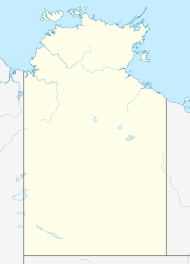Daly River, Northern Territory facts for kids
Quick facts for kids Daly RiverNorthern Territory |
|||||||||||||||
|---|---|---|---|---|---|---|---|---|---|---|---|---|---|---|---|

Daly River Roadside Inn
|
|||||||||||||||
| Population | 127 (2016 census) | ||||||||||||||
| Established | 1865 4 April 2007 (locality) |
||||||||||||||
| Postcode(s) | 0822 | ||||||||||||||
| Time zone | ACST (UTC+9:30) | ||||||||||||||
| Location | |||||||||||||||
| LGA(s) |
|
||||||||||||||
| Territory electorate(s) | Daly | ||||||||||||||
| Federal Division(s) | Lingiari | ||||||||||||||
|
|||||||||||||||
| Footnotes | Adjoining localities | ||||||||||||||
Daly River is a small town in Australia's Northern Territory. It's right next to the Daly River. In 2016, about 127 people lived there. The town is part of the Victoria Daly Region, which is a local government area. This spot is super popular for fishing, especially if you want to catch a big Barramundi! Many people think it's one of the best places in Australia for it.
Contents
The Story of Daly River
Early Days and the Mission
The Mulluk-Mulluk people are the traditional owners of this land. They have lived here for a very long time.
Europeans first came to Daly River in 1865. Boyle Travers Finniss, who was the first leader of South Australia, arrived then. He named the river after Sir Dominick Daly, who was the Governor of South Australia. At that time, the Northern Territory was part of South Australia.
In 1882, people found copper in the area. This brought miners to Daly River. There were some difficult times between the local Aboriginal people and the miners. In 1884, three miners were killed. The miners then reacted very strongly against the local Aboriginal people.
A year later, in 1885, the Society of Jesus (a group from the Roman Catholic Church) started a mission in the town. They wanted to introduce Christianity and farming methods to the local Aboriginal people. This first mission closed in 1899 after a big flood.
In 1954, the mission was started again. The church bought a lot of land, and the Missionaries of the Sacred Heart helped build a school and a health clinic. The mission was later renamed Nauiyu. Most of the mission land was given to the community. Because of the mission's history, about 75% of the people in Daly River identify as Roman Catholics.
Over the years, many attempts were made to grow different crops in the town. In the early 1900s, people tried to grow peanuts, tobacco, cashews, and sugar cane, but none of these attempts worked out well.
Big Floods
Like other rivers in the Top End of Australia, the Daly River often floods during the wet season. This has caused big problems for the small community over the years.
Major floods hit the town in 1899 and 1957, causing a lot of damage. On January 28, 1998, a huge flood happened. Every building in the town was covered in water! Everyone had to be flown out to Batchelor for safety. The floodwaters kept rising until February 3, reaching a record height of 16.8 meters.
Life in Daly River
Getting Around and Services
Daly River is a remote community. The main way to get there is by the Daly River Road. This road was sealed (made smooth) in 2007. Now, people can get to Darwin all year round, even when it's wet.
There's also a sealed airstrip in Nauiyu. This is used for special flights, like charter planes or medical emergencies. There are no regular flights though.
The town has a public library, a swimming pool, a school, and a health clinic. There's also a Catholic church called St Francis Xavier in Nauiyu. The Victoria Daly Regional Council has an office here, which provides many jobs for local people. Most jobs in Daly River are in public administration, like working for the government or local council.
The town also has a modern police station, built in 1994. Two police officers from the Northern Territory Police work here. They are in charge of a huge area, about 33,000 square kilometers! Their jobs include helping with emergencies and making sure people can get around by boat when roads are flooded.
Things to See and Do
Today, Daly River has a pub with motel rooms and several caravan parks. It's located right on the river, a few kilometers from the Daly River Crossing. The road from the main tourist route, the Stuart Highway, is now sealed.
The town is a great base for visitors who want to explore the Daly River Nature Park or go fishing for barramundi. The park is home to amazing wildlife like saltwater crocodiles, different reptiles, spiders, and cockatoos. You might also see wild pigs and Water Buffalo. The park's plants include mangroves, giant bamboos, pandanus trees, and the beautiful red kapok tree, Bombax ceiba.
About 5 kilometers east of Daly River, you'll find a turnoff to Woolianna. This area has many caravan parks. Just before you enter the town, there's another turnoff to the Nauiyu Aboriginal Community. This is where the Roman Catholic Mission is located, along with the Merrepen Arts Centre. At the art center, you can see and buy amazing local art. Merrepen Arts is very famous in the Top End. Some artists from the area, like Marita Sambono and Kieren Karritpul, have become nationally known. The art center and workshops are open to visitors on weekdays.
Weather in Daly River
| Climate data for Daly River (Mango Farm), elevation 15 m (49 ft), (1991–2015 normals, extremes 1980–2015) | |||||||||||||
|---|---|---|---|---|---|---|---|---|---|---|---|---|---|
| Month | Jan | Feb | Mar | Apr | May | Jun | Jul | Aug | Sep | Oct | Nov | Dec | Year |
| Record high °C (°F) | 39.4 (102.9) |
37.9 (100.2) |
38.9 (102.0) |
38.1 (100.6) |
37.2 (99.0) |
36.5 (97.7) |
37.0 (98.6) |
39.2 (102.6) |
40.6 (105.1) |
41.5 (106.7) |
41.5 (106.7) |
40.5 (104.9) |
41.5 (106.7) |
| Mean daily maximum °C (°F) | 33.5 (92.3) |
33.2 (91.8) |
34.1 (93.4) |
34.3 (93.7) |
33.0 (91.4) |
31.3 (88.3) |
31.7 (89.1) |
33.4 (92.1) |
36.6 (97.9) |
37.6 (99.7) |
36.5 (97.7) |
34.8 (94.6) |
34.2 (93.5) |
| Mean daily minimum °C (°F) | 23.8 (74.8) |
23.8 (74.8) |
23.6 (74.5) |
21.7 (71.1) |
18.4 (65.1) |
15.5 (59.9) |
14.8 (58.6) |
15.3 (59.5) |
19.1 (66.4) |
22.1 (71.8) |
23.3 (73.9) |
23.8 (74.8) |
20.4 (68.8) |
| Record low °C (°F) | 19.5 (67.1) |
19.1 (66.4) |
14.5 (58.1) |
10.0 (50.0) |
7.6 (45.7) |
5.1 (41.2) |
3.3 (37.9) |
4.6 (40.3) |
9.1 (48.4) |
10.5 (50.9) |
17.1 (62.8) |
20.4 (68.7) |
3.3 (37.9) |
| Average rainfall mm (inches) | 391.1 (15.40) |
351.5 (13.84) |
208.5 (8.21) |
71.6 (2.82) |
4.8 (0.19) |
0.2 (0.01) |
0.1 (0.00) |
0.7 (0.03) |
6.5 (0.26) |
44.5 (1.75) |
140.6 (5.54) |
283.0 (11.14) |
1,503.1 (59.19) |
| Average rainy days (≥ 1.0 mm) | 18.6 | 16.7 | 12.8 | 4.4 | 0.9 | 0.0 | 0.0 | 0.2 | 0.8 | 4.5 | 10.8 | 16.3 | 86 |
| Source: Australian Bureau of Meteorology | |||||||||||||
 | Ernest Everett Just |
 | Mary Jackson |
 | Emmett Chappelle |
 | Marie Maynard Daly |


